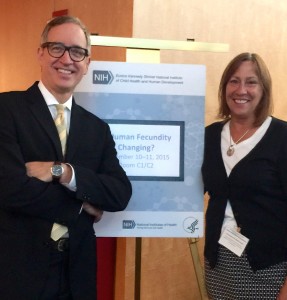How big was your family a couple of generations ago? Dial things back a half a century and you’d see that having 3 or 4 kids was pretty much average in America. Now, having 2 kids or fewer is the norm. What happened? Are we less fertile?
I know what you’re thinking: so what if modern families are smaller? What with urbanization, industrialization and vastly different socioeconomics, family size had to change too, right? To boot, couples now marry later (if at all) and use much better contraceptives to control their busy, engaged and productive lives. Makes perfect sense.
Human Capital

But, what if it’s not that simple. Could our sleepless and stress-filled lifestyles, our haphazard, airport-driven diets and rambunctious social habits be making us less fertile? Might the 87,000 known chemicals, endocrine disruptors and just plain old pollution hovering over our post-industrial environment finally be rearing their ugly heads and affecting reproduction? And exactly what risk does this bring to bear on future generations?
It tends to matter to governments that their populations can sustain themselves, and that’s in part why the Feds asked us to meet this week in Washington. Fifty or so great minds, from all over the globe, sequestered in a room for 2 days to address one simple question: “Is Human Fecundity Changing?
Slice and Dice
As a surgeon, I am a big fan of dichotomous answers. Gather information to answer a simple question: to cut or not. It makes for a simple life. But the truth here is that the answers are entirely unknown and when they become known, they will certainly not be quite so cut and dry.
Here are some of the truths that I took away from this mind-bending think tank:
- Infertility is estimated to effect 15% of couples in the U.S. and globally, and it is not at all clear that this rate has changed over time.
- Definitions matter. “Fertility” reflects sheer birth numbers, but “fecundity” assesses the innate capacity to reproduce. We agreed that changes to fecundity are more worrisome, but are also harder to measure.
- Much of human infertility may actually be “social” and not biological in origin. Jobs, disasters, wars, divorce and the like comprise the messy aspects of life that can heavilyinfluence reproductive behavior.
- As a corollary, the several decade trend toward later “unions” causing delayed reproductive “coupling” decreases critical baby making “exposure time” and might be significantly influencing human fecundity.
- Environmental impacts on human fertility are incredibly difficult to assess, something akin to finding small needles in large haystacks.
- Using math to model sexual behavior, however inhuman that sounds, could provide clues about temporal trends in infertility, particularly among advanced parental age couples.
- We need a better biomarker than the simple, unruly and widely variable semen analysis to help us assess changes in male fecundity.
Ever the optimist, I believe that we are still the simple and reproductively capable cavepersons we once were, only mildly diverted by our bigger brains that have led us to think a little too much and too often. Given the serious intellectual firepower and interest that is now being dedicated to this issue, I am certain that elemental truths will usher forth on this hot and steamy topic with time.
Cross-posted from Turekonmenshealth.com




It seems as if American Society today has simply taken as fact that fertility has decreased since the early and mid 1900’s. My mother, in her early 60’s, was one of three kids, a sentiment which she echoes was the standard of growing up in the 50’s and 60’s. Nowadays, we see more examples of being the only child. Maybe we have let our lives–the professional, social, and extracurricular aspects get in the way of our reproductive nature of old. Perhaps it is time to slow down, reevaluate, and take time to enjoy the smaller accomplishments in life.
I really liked this article and the differences you presented when discussing infertility. Fertility has always been a growing issue, but marriage and starting families can be put on the back burner, especially in larger cities. Maybe it’s the biological clock that makes our decisions for us sometimes.